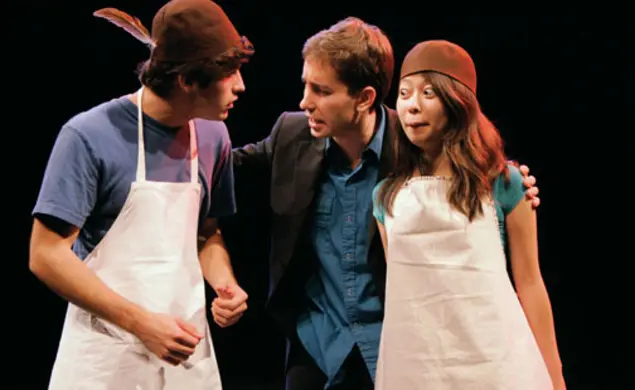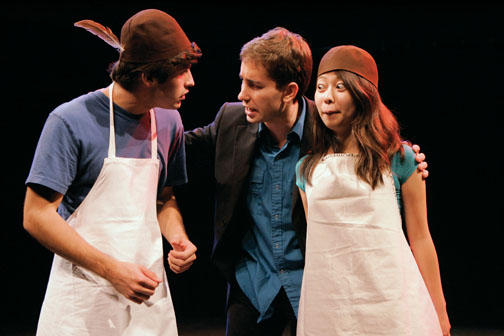Vive la France! Students bring French theater to the stage
 From left, Tyler Lawrence ’16, Mikhail Tikhonov GS, and Remi Yamazaki ’14 perform in Molière’s “L’Ecole des Femmes,” staged by the campus group L’Avant-Scène.
From left, Tyler Lawrence ’16, Mikhail Tikhonov GS, and Remi Yamazaki ’14 perform in Molière’s “L’Ecole des Femmes,” staged by the campus group L’Avant-Scène.After filling his freshman-year schedule with engineering classes, Cole Freeman ’14 signed up for an introductory French language course on a lark.
This fall, he took the stage as Horace in Molière’s L’École des Femmes, a masterpiece of 17th-century theater, delivering a long speech — in French verse — on the effects of love. The two-hour performance was staged by Princeton’s L’Avant-Scène, a student theater company that presents four full-length French plays a year. It is the only American college theater group dedicated to performing plays in French, according to several French scholars.
Freeman is one of 16 Princeton students — both undergraduate and graduate — who make up the theater workshop, which regularly has tackled 17th-century classics such as Le Misanthrope, Phèdre, and Tartuffe.
“It’s a huge amount of work, but I always have fun,” said Freeman, who got involved in L’Avant-Scène after learning about it in a French class. He dropped engineering to major in French.
The students of L’Avant-Scène have varied backgrounds — some grew up in French-speaking countries such as Belgium and Mauritius; some are Americans who learned French as children; and others took up French for the first time at Princeton. While some are French majors, others major in biology, engineering, and art history.
“The students come to L’Avant-Scène with a passion for French language and culture,” said Florent Masse, a senior lecturer who founded the group. “They develop fluency while mastering the classical and modern repertories of French theater. The demands of theater serve the pedagogical objectives of language learning — being heard and understood, and using good pronunciation.”
Mikhail Tikhonov is a fourth-year Ph.D. student in theoretical biophysics who has performed in five L’Avant-Scène productions.
“It’s an amazing way to discover great works of literature,” said Tikhonov, who is Russian and studied in France for three years. But squeezing in two or three hours of rehearsal a day leading up to performances isn’t easy for him. “I do nothing but this and my academic work,” he said.
Students in Princeton’s advanced French courses benefit from L’Avant-Scène as well. They study the text of one of the group’s plays in class and then attend a performance.
Madeleine Planeix-Crocker ’15, whose parents are French, grew up in Los Angeles and has been doing theater since the first grade. The hardest part of L’Avant-Scène, she said, is “conveying to the audience that a Molière play is pertinent in the 21st century.”
Planeix-Crocker and the group’s five other sophomores planned to travel to Paris with Masse during fall break for an eight-day immersion in French theater, an annual trip for L’Avant-Scène members. They were scheduled to meet directors and actors, attend classes at one of France’s leading universities for acting, and see a play every night.
“L’Avant-Scène is a unique opportunity for students,” said professor François Rigolot, who has taught French at Princeton for 40 years and has snagged a few small parts in L’Avant-Scène productions, which draw audiences of about 120. The students, he said, had “much longer and more complicated roles” than he did. “I learned much from them.”
The Latest
See all







